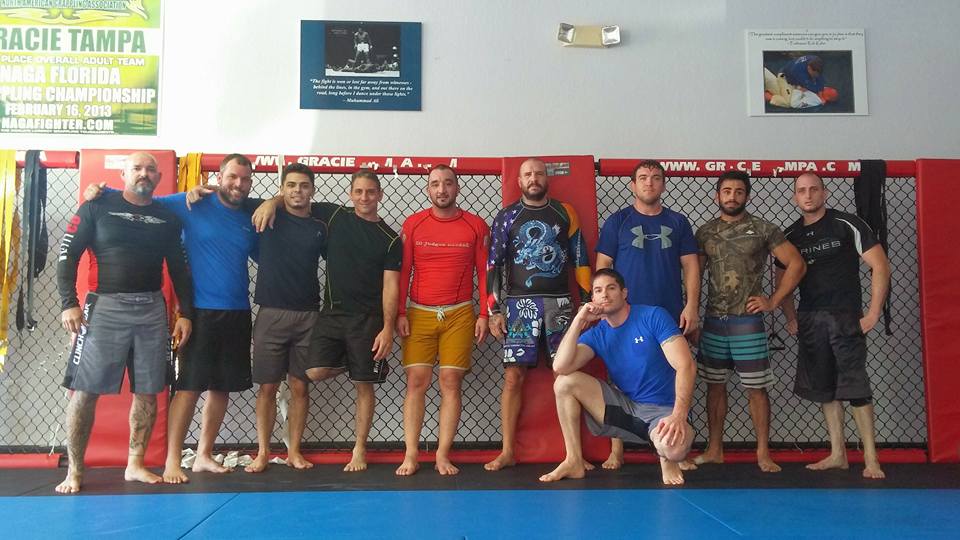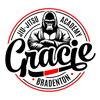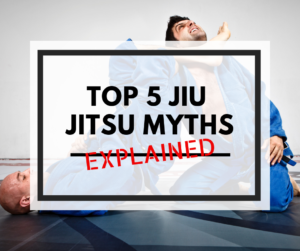Lessons I Learned After One Year At Gracie Tampa

Just about a year ago, me, my wife, and son moved to Tampa, FL. In part we wanted a new climate, plus her parents are down here. But another reason (probably the biggest for me) was to be able to train full-time with Rob Kahn, the owner and head instructor for Gracie Tampa. Since being here for almost a year, I’ve been told by my training partners and coaches (including Rob) that my Jiu Jitsu has improved by leaps and bounds. But why? The reasons might surprise you because they have very little to do with technique. In fact I recently had a conversation with Rob where we both agreed that I’ve probably learned about 10% new techniques and 90% new strategy and philosophy.
The way I think about Jiu Jitsu has changed 180 degrees. Almost everything I thought about Jiu Jitsu was wrong. The way I train has changed dramatically, my understanding of winning and losing has changed, my understanding of what constitutes a productive roll has changed, and the means by which I evaluate myself have changed. These are the core concepts that have helped me improve and I wanted to explain a few of them so that I may pass on some of the knowledge I’ve received here in sunny Tampa.
1. I wasn’t actually doing jiu jitsu
I have been in some serious battles on the mat. No question about it. Both here and up in Connecticut where I’m from. I’ve had matches that have lasted 20 to 30 minutes, sometimes ending in no tap. In these matches, I would be training for dear life and so would my partner. I’d get him into a kimura and he would hold out for as long as possible and I’d do the same. We would fight off every submission attempt, use an abundance of energy , strength, heart and determination to win. Just about the only thing we weren’t using was Jiu Jitsu.
Jiu Jitsu requires fine motor skills and when you’re that deep into a match and that invested in winning, those fine motor skills go out the window. During one of the first rolls I had with Rob after moving here, I was in his guard and every time he tried to start setting up a submission on me, I ripped my arm away from him. This went on for 5 or so minutes before he finally tapped me. My first thought was “holy shit, I just went 5 minutes with Rob and he only caught me once.” This type of thinking is extremely flawed by the way, but more on that later. I was proud of myself for lasting with Rob, that is until he informed me that I wasn’t doing jiu jitsu.
I couldn’t even fathom this at first. After all, I was in his guard wasn’t I? I was trying to pass wasn’t I? We were in a jiu jitsu match weren’t we? The truth is that I actually wasn’t trying to pass Rob’s guard. I was simply sitting in Rob’s guard with one goal, to not get caught. Even though I THOUGHT I was doing jiu jitsu, and I THOUGHT I was trying to pass his guard, the reality is that I was only playing defense and I never even tried to pass. I was doing nothing to advance my position and I wasn’t trying to submit Rob. I was simply sitting in his guard, doing nothing but ripping my arms out of his hands and resetting back to zero. In all reality the roll never had a chance to even get started.
The guys who are the most successful down here are the ones who try things so many times (even at the high risk of losing) that they get really good at the things they are trying and end up learning how to make those things work. For instance, if you actually go for an arm bar from the guard with everyone you roll with, every time you roll, you will have no choice but to get good at the arm bar. But if you are scared of doing the arm bar because you might lose position or any other reason for that matter, you are missing excellent training opportunities. So the point is, put yourself out there, don’t care about getting caught or something not working. Try it, let it fail, try it, let it fail, keep doing this until it doesn’t fail.
One of Rob’s black belts, Bamboo, after I rolled with him for the first time (back when he was a no talent brown belt – Just kidding Bam) gave me advice that blew my mind. Once again I was THINKING that I was doing jiu jitsu, but in all reality I was sitting there doing nothing. Bamboo asked me, how many times did you try to pass my guard? How about when I was in your guard? How many times did you try to sweep or submit me? And when I thought about it, I realized that I was simply trying to stop him from passing my guard, I wasn’t countering and I wasn’t threatening him with any kind of offense. But this combined with my recent experience rolling with Rob made me sit back and realize, I wasn’t even doing jiu jitsu. And it made me wonder, how long have I not been doing jiu jitsu? In order to do Jiu Jitsu, you have to play the game. You can’t just sit there and avoid the roll, you have to participate. This lesson has made the biggest difference in my jiu jitsu. When I get caught by Rob playing the anti-jiu jitsu game or when I catch myself doing it, I feel like an idiot.
2. Training time is precious, don’t waste it
Rob has a rule he calls the 70/30 rule. That is, 70% of the time you should roll with guys you can beat and 30% of the time you should go for those tough rolls (the battles). You gain more from rolling with guys you can beat than you do rolling with any other type of competitor. Why? Because when you roll with guys you can beat, you can control the roll and rep your moves. If my goal is to practice the near side armlock, but I’m rolling with a guy who’s guard I can barely pass, I’m not going to get many reps of that move in. Instead, I should find someone to roll with who’s guard I can easily pass so I end up on their side enough times that I can practice what I want to practice. By doing so, I’m repeating a move on a resisting opponent over and over. Now I’m getting better.
3. Strategy is key
It’s one thing to read the BJJ Manifesto, it’s another thing to have it told to you by the author every time you train. The BJJ manifesto is Rob Kahn and Matt Arroyo’s book on Jiu Jitsu strategy. Nothing is more important in Jiu Jitsu than strategy. You could know all the moves in existence, but without the right strategy your moves will not and can not work. Examples of this are talked about and seen on the Gracie Tampa mat every day. It’s impossible to ignore. For instance, it’s one thing to know how to pass someone’s guard, it’s something else to know when to do it. It’s one thing to have your opponent make a mistake, it’s something else to force them or trick them into making that mistake. Jiu Jitsu is a thinking person’s art, therefore one needs strategy and concept or the technique is meaningless.
One of the biggest examples of strategy that I’ve learned is the idea of putting yourself deeper into something in order to get out of it. Rob has told me that he doesn’t believe in defense. He believes in counters. Once again, I didn’t understand this concept until I found myself giving up the submission on purpose so I could pull off a counter. For instance, if you’re in someone’s guard, you can give up the triangle, the arm bar, the kimura and even the guillotine as long as you have a plan to counter and pass. Sure, you’re going to get caught when you first start doing this, but that’s the game. That’s how you learn when you’ve gone too far or done something wrong. Then you get back into the person’s guard and try again. There are so many lessons about strategy that it would be impractical to list them all, but I would highly recommend that you start by purchasing the BJJ Manifesto from http://bjjmanifesto.com. Then read it, a lot.
4. Self evaluation
Black belts say the darndest things. Rob said to me about 6 months ago, “Sonny, you’re getting a lot better, I’m tapping you more now.” What?! That doesn’t even make sense! How am I improving if you’re tapping me more? It’s pretty simple actually. I’m now doing jiu jitsu with Rob. Not simply sitting there trying not to get tapped. I’m flowing, I’m taking shots at the goal, I’m going for things. But all of that means that I’m putting myself out there more to be tapped. But the benefit of trying to play this game rather than just sitting there trying to not get tapped is that I’m learning this game. You evaluate yourself by seeing how well your actual jiu jitsu works, not by how long you can hold out from getting tapped. Now when I roll with Rob, I consider it a good roll if I try to catch him, sweep him and/or pass his guard. I will likely fail at all those things, but at least I’m doing jiu jitsu.
These are the four main concepts I’ve learned after a year at Gracie Tampa. My training is going well, I’m looking forward to my next roll.



